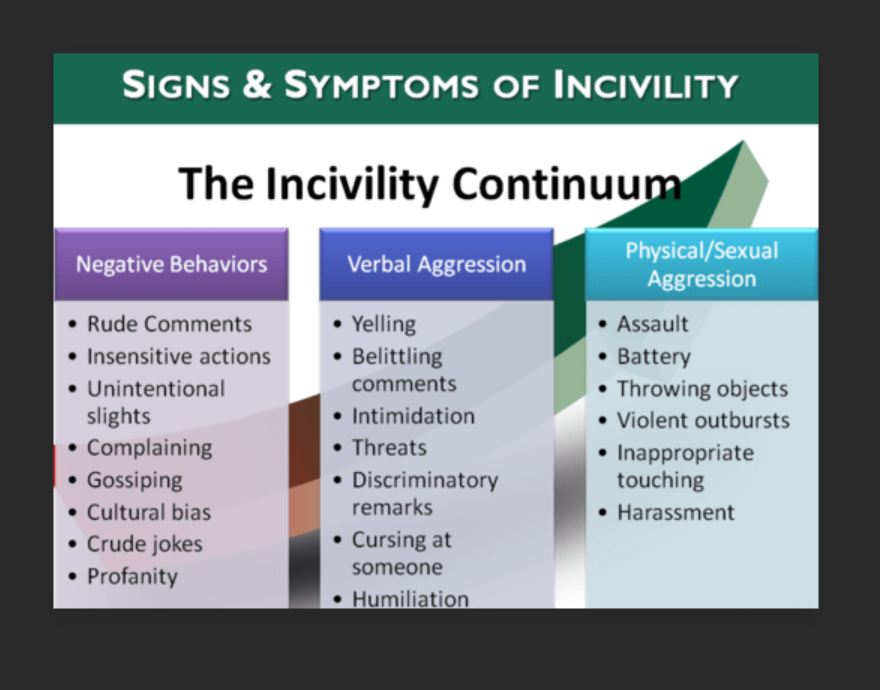Date:
19 April 2024
Page URL:
https://ntk.eastamb.nhs.uk/news/the-link-between-rudeness-and-bullying.htm?pr=
The link between rudeness and bullying

By Hein Scheffer, Director of Strategy, Culture and Education
All of us prefer to be spoken to in a way that is polite and respectful. It helps make the working day more pleasant. But did you know that being civil to each other can help save lives, too?
What is the Incivility Continuum?
Civility and respect are about how we treat each other at work. In highly pressurised NHS systems, disrespectful and rude behaviours can become all too commonplace and this can have a detrimental impact on staff wellbeing and patient care.
The Incivility Continuum, according to Dr. Gary Namie of the Workplace Bullying Institute, explains how rude comments can lead to workplace bullying, harassment and possibly even homicide and suicide. The diagram shows the three stage that lead to workplace bullying.

Reducing bullying and harassment
This type of uncivil and disrespectful behaviour is unacceptable. It is unprofessional, unnecessary, and has no place in our NHS working environment.
The NHS Long Term Plan recognises that levels of bullying and harassment must come down if the NHS is to achieve its aim of becoming the best place of work and being an employer of excellence.
The People Plan for 2020/21 emphasises that all NHS employees and employers are responsible for tackling bullying and harassment and creating a civil and respectful culture. We know, too, that staff with one or more protected characteristics, for example, disabled, BME and LGBTQ+ colleagues, are twice as likely to experience bullying and harassment.
Why is civility important?
Chris Turner is a consultant in emergency medicine at University Hospitals of Coventry and Warwickshire. He runs Civility Saves Lives, a campaign that aims to raise awareness of the power of politeness in healthcare.
Chris explains that how we treat each other at work has an enormous impact on how teams perform, with potentially fatal consequences for patients. In this TED Talk, Chris reveals the shocking impact of rudeness in the workplace, arguing that civility saves lives.
When rudeness in teams turns deadly | Chris Turner | TEDxExeter - YouTube
What impact does inappropriate ‘banter’ have?
The impact on people can be extreme. A 2018 study by the Institute of Leadership & Management found that 4% of 1000 people surveyed had left a job because of negative banter. The study found that women are twice as likely as men to have been negatively affected by workplace banter, with 1 in 10 women citing it as a cause of mental health issues. Women are also less likely to challenge inappropriate behaviour than their male colleagues. (55% compared to 73%).
People’s morale can be seriously affected as can their attendance, focus on work, focus on their personal needs and for patient facing staff, this could negatively impact the quality of care they provide. The Civility Saves Lives campaign has highlighted that disrespect and rudeness create an environment where quality of work reduces, people are less likely to help each other and there are more errors as people are afraid to speak up and patients feel anxious.
How can we make sure we are aware of the impact that our words might have?
Sometimes we slip into the kind of behaviour that we may adopt when in a social scenario. What might be ‘normal banter’ in that environment, where you have an understanding of the boundaries of your friends/peers, might be inappropriate or even offensive in the workplace.
None of us are perfect but all of us can be more self-aware of the behaviours we demonstrate and how it can impact others. By being open to learning, listening and educating ourselves, we can develop a greater understanding of how our behaviour can affect others. At EEAST we take the issue of civility very seriously and offer a range of educational tools, including:
- Skill boosters videos – Available on Evolve (Accessible Development for All)
- V&B training (Mandatory) – All staff
- Research – online, books, podcasts, webinars etc.
- Reading and becoming familiar with the Dignity @ Work Policy http://east24/connector/Policies%20on%20website/hr/dignity-at-work-policy.pdf
What should I do to ensure civility?
There is lots you can do to reset the way you approach others. Some examples include:
- Take responsibility for your own actions and behaviours, and consider what impact you have on others in terms of your approach
- Speak to others as you would want to be spoken to
- Avoid negative and accusatory language
- If someone has upset you in their behaviour, try to speak to them and address it in a way which helps them to understand the impact of their actions. If you feel unable to do this, raise your concerns with a manager
- Do not engage in discussions about an individual co-worker or colleague – bad mouthing or belittling individuals to others is wholly inappropriate and causes lasting damage and unhealthy relationships. If someone has caused upset, speak to them directly to resolve the issues between you or speak up so that action can be taken
Also, please take care with your language. Using foul language in every day conversations is not professional and is unacceptable.
What can I do if I experience unacceptable ‘banter’?
- If you feel safe enough to raise the issue with the person or people engaging in the ‘banter’, you could explain to them why you find it unacceptable.
- Or you could raise it with your line manager unless they were in some way part of the issue.
- Alternatively, the Freedom to Speak Up Guardians are in place to listen and guide in such situations.
The most important thing is to raise the issue, even it’s to a colleague. Feeling upset and keeping it to ourselves could build up and result in poor mental health or conflict at work.
The NHS Social Partnership Forum have produced a toolkit to support and promote civil and respectful cultures:
Tuesday 16th August 2022
